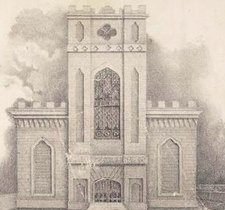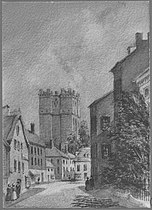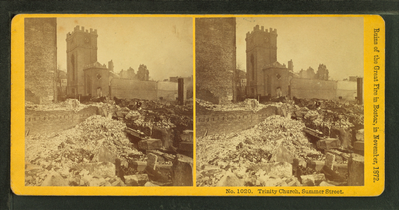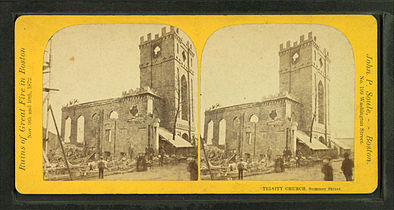Trinity Church, Boston (Summer Street)


Trinity Church (1735-1872) was an Episcopal church in Boston, Massachusetts, located on Summer Street.[1] It housed Boston's third Anglican congregation. The Great Fire of 1872 destroyed the church building, and by 1877 the congregation moved into a new building in Back Bay.[2][3]
History[]
1728-1827[]
When Boston's King's Chapel became overcrowded, some members of the congregation organized a new church beginning in 1728. The newly constructed Trinity Church opened in 1735. The wood building "was 90 feet long, and 60 broad, without any external adornment. It had neither tower nor steeple, nor windows in the lower story of the front. There were 3 entrances in front unprotected by porches. The interior was composed of an arch resting upon Corinthian pillars with handsomely carved and gilded capitals. In the chancel were some paintings, considered very beautiful in their day."[4]
Ministers included Addington Davenport (1740-1746); William Hooper (1747-1767); William Walter (1767-1776); Samuel Parker (1779-1804); John Sylvester John Gardiner (1805-1830).[1][4]
Parishioners included Peter Faneuil, Charles Apthorp, Philip Dumaresq, William Coffin, Thomas Aston Coffin, Leonard Vassall, Samuel Hale Parker. In 1789 George Washington worshipped at the church.[4][5][6]
1828-1872[]
George W. Brimmer designed the second Trinity Church building on Summer Street, completed in 1829. One writer described it as a "massive temple of rough-hewn granite and ponderous square front tower"[7] The "Gothic Revival-style church served as a prototype for many of the earliest New England churches in the Gothic Revival style."[8]
Ministers included George Washington Doane (1830-1833); Jonathan Wainwright (1833-1838); Manton Eastburn (1843-1869); Phillips Brooks (1869-1891).[6]
After the fire of 1872 swept through downtown Boston, Trinity Church fell to ruins: "its broken tower and partly crumbled walls presenting the most picturesque ruin of all in that costly conflagration."[7]
By 1877, the congregation moved into its new Trinity Church building in Copley Square.
Ministers[]
- Addington Davenport (1740–1746)
- William Hooper (1747–1767)
- William Walter (1768–1776)
- Samuel Parker (1779–1804)
- John Sylvester John Gardiner (1805–1830)
- George Washington Doane (1831–1832)
- Jonathan Mayhew Wainwright (1833–1838)
- Manton Eastburn (1842–1868)[9]
- Phillips Brooks (1869–1891)
See also[]
- Trinity Church, Boston
References[]
- ^ Jump up to: a b Boston Directory. 1823.
- ^ Edwin Monroe Bacon. Boston: a guide book to the city and vicinity. 1922.
- ^ The new building in Back Bay was designed by H.H. Richardson and is now a National Historic Landmark.
- ^ Jump up to: a b c Samuel Adams Drake. Old landmarks and historic personages of Boston. 1873.
- ^ Justin Winsor. The memorial history of Boston. 1886.
- ^ Jump up to: a b Bacon's dictionary of Boston. 1886.
- ^ Jump up to: a b Edwin M Bacon. Washington Street, old and new : a history in narrative form of the changes which this ancient street has undergone since the settlement of Boston. Boston : Macullar Parker Co., 1913.
- ^ Roger G. Reed. Building Victorian Boston: the architecture of Gridley J.F. Bryant. Univ of Massachusetts Press, 2007; p.20.
- ^ "Boston Pulpit". Gleasons Pictorial. Boston, Mass. 5. 1853.
Image gallery[]

The newly constructed Trinity Church building, Boston; illustration published in Bower of Taste, c. 1829

Summer Street view, 1846

Summer Street view, 1846

Trinity Church on Summer St., after fire of 1872

Trinity Church on Summer St., after fire of 1872

Trinity Church on Summer St., after fire of 1872
Further reading[]
- John Sylvester John Gardiner. A discourse delivered at Trinity Church, Boston, July 23, 1812 on the day of publick fast in Massachusetts upon the declaration of war against Great-Britain. Boston: Munroe & Francis, 1812.
- John Henry Hopkins. Religion the only safeguard of national prosperity a sermon preached in Trinity Church Boston, December 1, 1831, being the day of annual Thanksgiving. Boston: S.H. Parker, 1831.
- The records of Trinity Church, Boston, 1728-1830. Boston: Colonial Society of Massachusetts, 1980-1982.
External links[]
| Wikimedia Commons has media related to Trinity Church, Boston (Summer Street). |
- Boston Public Library. Images of Trinity Church, Boston
- Boston Public Library. Item related to Trinity Church from Gleason's Pictorial
- New York Public Library. Item related to Trinity Church
Coordinates: 42°21′17.86″N 71°3′35.07″W / 42.3549611°N 71.0597417°W
- Former buildings and structures in Boston
- 18th century in Boston
- 19th century in Boston
- Financial District, Boston
- 1728 establishments in Massachusetts






